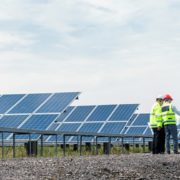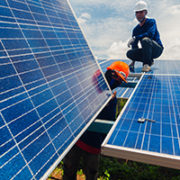Tag Archives | Dina Azhgaliyeva
Climate change, Energy, Finance sector development
 Energy, Governance and public sector management
Energy, Governance and public sector management
 Climate change, Finance sector development
Climate change, Finance sector development
 Energy, Regional cooperation and integration
Energy, Regional cooperation and integration
 Economics, Environment, Finance sector development
Economics, Environment, Finance sector development
 Economics, Energy
Economics, Energy
 Economics, Energy
Economics, Energy
 Economics, Energy
Economics, Energy

Green bonds show promise for financing energy-efficient buildings in Southeast Asia

The member countries of the Association of Southeast Asian Nations (ASEAN) have been experiencing a surge in energy demand due to their growing populations, expanding economies, and rising living standards. One reason for this rising energy demand is increased activity in the building and construction sector.
Kazakhstan and the Kyrgyz Republic need more than energy access to promote clean fuels

Air pollution in the cold countries of Central Asia is particularly high during winter due to the consumption of solid fuels for space heating. Evidence-based policy recommendations are needed to facilitate the transition from solid fuel consumption to the use of cleaner fuels for residential heating and cooking, particularly in Kazakhstan and the Kyrgyz Republic. This is important not only for improving health conditions for the inhabitants and visitors in these countries but also for reducing the life-threatening health hazards arising from indoor cooking and heating.
Which financing sources matter for private investment in renewable energy in Asia?

The mobilization of climate finance is critical for limiting global warming to within 1.5°C and preventing catastrophic climate change (IPCC 2018). Annual green investments totaling $1.5 trillion are needed (United Nations 2017). Despite the falling cost of renewable energy technologies, energy investments remain dominated by investments in fossil fuels. In Asia and the Pacific, annual investments fell after 2017 and until 2020 remained below the 2017 level.
Diversification of solar PV suppliers for sustainable energy during the COVID-19 crisis

Experts are increasingly acknowledging the vulnerability of the global solar photovoltaic (PV) value chain due to the concentration of manufacturing capacity in only a few countries, such as the People’s Republic of China (PRC) (Zhai 2020). In Japan, although solar power comprised only 7% of the country’s total power generation in 2018, it contributed to one-third of power from renewable sources. Given this high share of solar power in renewable energy sources, disruption in the availability of solar PV may have adverse consequences on the sustainability of renewable energy power generation.
Achieving policy objectives for green bonds in ASEAN

The latest Intergovernmental Panel on Climate Change report, Global Warming of 1.5 ºC, notes the importance of mobilizing green finance for limiting global warming to 1.5 degrees Celsius and preventing catastrophic climate change. In line with this, some countries have been implementing policies to support green bonds. Green bonds are debt securities whose proceeds are used to fund environmental projects, including climate change mitigation and adaptation. Therefore, unlike conventional bonds, green bonds finance projects with clear environmental benefits (ICMA 2018).
Economic integration and energy efficiency for energy security in ASEAN

The security of energy supply is crucial for rapid growth in Southeast Asia, but it is being increasingly challenged by the region’s fast-growing energy demand. This high demand can be explained by improvements in energy access as well as population and economic growth.
Political risks in energy-transporting countries and energy security in the Caspian Basin

Energy security is a crucial issue in contemporary international relations but not a new one. It is usually defined as the reliable and sufficient supply or demand of energy at acceptable prices and is at the top of the agenda for both energy-importing and energy-exporting countries.
Feed-in tariffs and loans for boosting private investment in renewable energy

Investment in renewable energy of $9 trillion is required to meet global energy supply needs by 2040 (International Energy Agency 2016), but investments in fossil fuels still dominate those in renewable energy. Many countries are implementing national energy policies, including fiscal, financial, information and education, institutional support, strategic planning, regulatory, and voluntary measures, to promote greater private investment in renewable energy.


Search
Subscribe / Connect to Asia Pathways
Subjects
- Accelerating Progress in Gender Equality
- Addressing Remaining Poverty and Reducing Inequality
- Agriculture and natural resources
- Capacity development
- Climate change
- Economics
- Education
- Energy
- Environment
- Finance and Innovation
- Finance sector development
- Gender
- Globalization and Economic Stability
- Governance and public sector management
- Health
- Industry and trade
- Information and Communications Technology
- Infrastructure
- Making Cities More Livable
- Miscellaneous
- Population
- Poverty
- Private sector development
- Regional cooperation and integration
- Sanitation
- Social development and protection
- Strengthening Governance and Institutional Capacity
- Subjects
- Transport
- Uncategorized
- Urban development
- Video Blog
- Water
Recent Posts
- From Crisis to Resilience: The Evolution of the Banking Sector in Asia and the Pacific
- Tariffs on the Table: What Could Be Asia’s Next Move?
- Investing in Childcare a Win for Women and the Economy
- Flush and Flourish: Upgraded Toilets Can Transform Lives in Rural Asia
- New Ways for Climate Finance and Development in Asia and the Pacific




Recent Comments